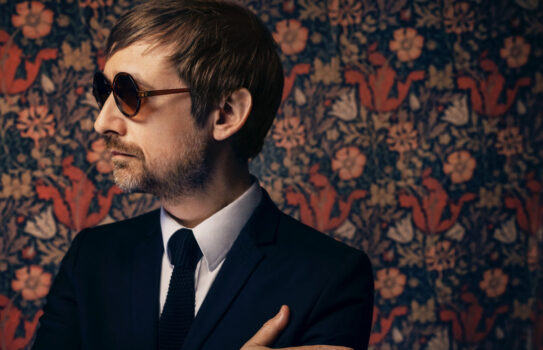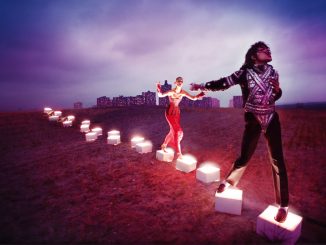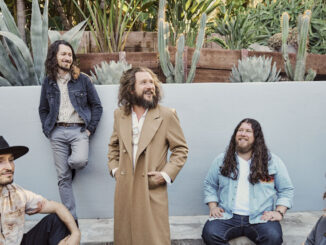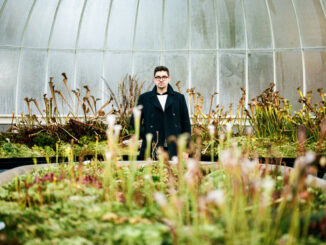The Divine Comedy’s five-night residency at the Barbican was initially billed for October 2020 to celebrate the band’s 30th anniversary. The Irish chamber pop band would chronologically play their first ten LPs back to back. After a two-year wait, frontman Neil Hannon with an eleven-piece band finally got to showcase their classic albums in their entirety and original track listing order.
XS Noize caught up with the band at their Barbican residency midpoint. For the performance’s first half, The Divine Comedy played their 1998 fifth LP, Fin De Siècle. The second segment saw the band play Regeneration, their first twenty-first-century album released in 2001. The choice of albums was ideal. Fin De Siècle includes The Divine Comedy’s most commercially successful singles, ‘ National Express’ and ‘Generation Sex’, and a quirky operatic soundtrack. In contrast, Regeneration, released after The Divine Comedy’s first greatest hits compilation in 1999, was a darker, guitar-led affair.
With an eleven-piece band, flowers and a Bloody Mary, Hannon and his band opened with Fin De Siècle’s’ Generation Sex’, an audience-captivating upbeat song usually reserved for the latter part of a Divine Comedy gig. The sophomore James Bond-themed track “Thrillseeker” followed, which saw Hannon first play the triangle. The next track, “Commuter Love”, an intense French lyrically and musically influenced song, immediately proved to be an underrated classic. “Sweden” then excelled with eccentrically as if it was a soundtrack to a murder mystery. “Eric the Gardener” followed, which saw Hannon quote Caesar to a soundscape taking the audience on a mindful, spiritual journey to find one’s inner chi. Eight and a half minutes of pure genius and enlightening tranquillity.
At the midpoint, Fin De Siècle took a less obscure and leftfield direction as the band played ‘National Express’. Hannon pulled out all the stops by wearing cabin crew headwear and getting members of the front row to sing into the microphone. Despite its tragic lyrics, the dark accordion-laden “Life on Earth” left the Barbican Hall upbeat and galvanised. “The Certainty of Chance”, a popular Divine Comedy live staple followed before “Here Comes the Flood” was played. “Here Comes the Flood” blended the best of sixties, Big band and Burt Bacharach arrangements whilst perfectly sugar-coating the apocalyptic lyrics. The playout “Sunrise” beautifully opened with the harpsichord and offered a perfectly dramatic and climatic operatic ending.
The Divine Comedy then played their Regeneration set. The opener “Time stretched” through an acoustic, percussion-led backdrop addressed the anxiety of insufficient time and resources, contrasting with the upbeat mockery of the Fin De Siècle opener’ Generation Sex’. Whether it was the increased use of the guitars on the next track, “Bad Ambassador”, Hannon became punk in his attitude, saying, “if you don’t like it, you can get the hell out”. There was never any danger of that. There were also no qualms with the following upbeat pop love song that followed appropriately called “Perfect Lovesong”.
Hannon wisely ripped the band-aid off once the band concluded “Perfect Lovesong” by saying, “That’s the fun stuff done. Now into an abyss of paranoia”. Whilst the reception to this statement was one of uncertainty, as the following six-minute “Note to Self” began to play, the audience realised the higher dosage of darkness and trepidation with a bass guitar made this Nigel Godrich-produced LP a standout classic. The haunting theme continued beautifully with “Lost Property”. “Eye of the Needle” was exceptionally outstanding in synchronising the church organ with bass guitars. Regeneration’s lead single, “Love What You Do”, about overcoming adversity and negative thoughts, confirmed how well Hannon had amalgamated guitar-based indie into his signature chamber pop sound.
If there was a Divine Comedy song that saw into the future and was proven right, it was “Dumb it Down”. The lyrics “Your concentration span’s too long, It’s longer than this song, that’s not allowed…” reflect the present to a timeless anxiety-ridden soundscape. Hannon then stopped to talk about appearing on and winning the show Mastermind. A track of the same name followed about madness through a soothing easy, listening piano-based melody.
Another rare glimpse of Hannon espousing punk behaviours was witnessed when he switched his Bloody Mary to Bottled Beer and complained that his “knees were fucking killing…(him)” before playing the penultimate track which shares the same title as the band’s 2001 album. The unsettling guitar-based ambience brilliantly addressed themes of continuous unsettling and disruptive change.
Whilst Regeneration’s finale, “The Beauty Regime”, addresses the pursuit of growth and consumerism through negative self-image, “The Beauty Regime” is both a love song and resistance. By insisting on not letting “them sell you impossible dreams” and not “be a slave to the beauty regime”, The Divine Comedy also offers reassurance to “Look again in the mirror and see Exactly how perfect you are”. Like the rest of Regeneration, “The Beauty Regime” called out society for what it was and what it was becoming and did eventually become. Whilst there isn’t a way to contain, let alone defeat, these forces, thanks to Neil’s guidance, we can make ourselves immune to them. This poignancy of this message made the impact of Regeneration greater than Fin De Siècle live, despite Fin De Siècle having the more upbeat and singalong hits.
As well as indulging the audience with two back-to-back albums, The Divine Comedy also played the Promenade classic “When the Lights Go out All over Europe” and concluded the set with a song that often ends live shows and physical music releases, “Tonight We Fly”.
The Divine Comedy has never failed to impress live. After three decades, they could easily sit comfortably and stick to tested crowd-pleasing formulas. Instead, the band challenged themselves and their devoted fans and enriched the mutual experience. Quirkiness, darkness and sincerity with a dash of seldom-seem punk attitude from Hannon have continued to evolve the already exceptional The Divine Comedy’s live performance.
INTERVIEW: Neil Hannon on Charmed Life – The Best Of The Divine Comedy, the new Wonka prequel & more – Listen here.





Be the first to comment